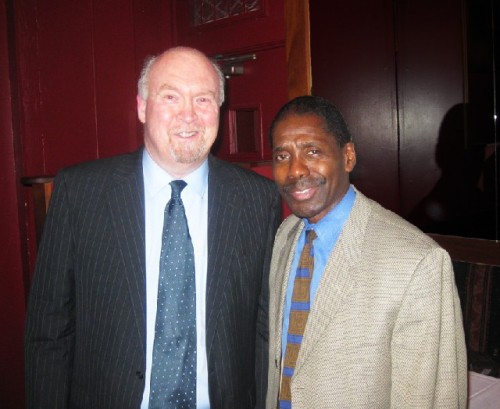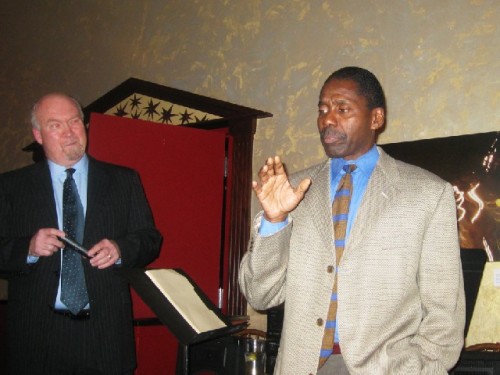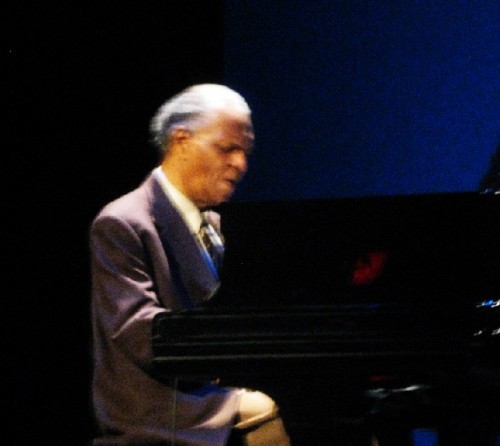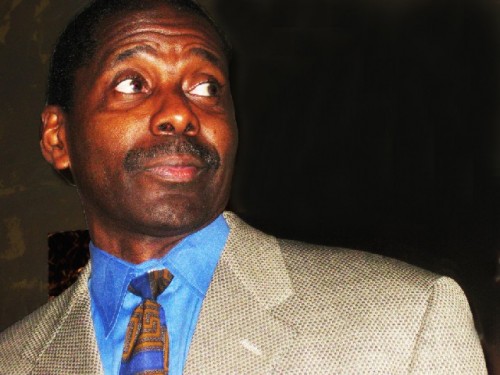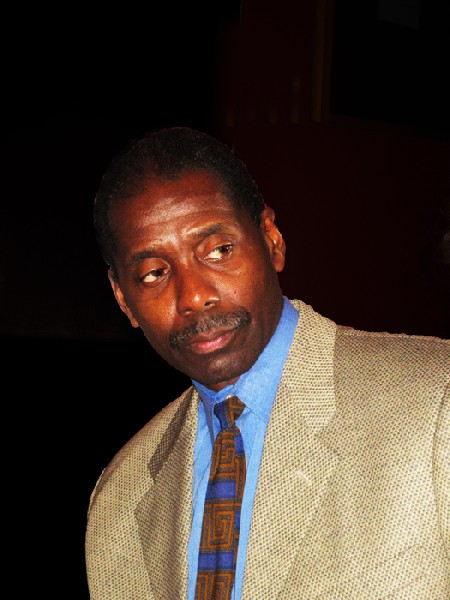Avery Sharpe Toured with McCoy Tyner
Bass Player a Long Time Berkshire Resident
By: Tom Reney - Feb 22, 2010
"When I leave the planet," Avery Sharpe told me a couple of years ago, "I want to go as a note continually in vibration." Avery was discussing his profound love of music in anticipation of a composition that he was about to premiere with the Springfield Symphony Orchestra. For the bassist, who'd come to prominence with the McCoy Tyner Trio, this new work for Trio and Symphony Orchestra, "Rhythm in Red, White and Blues," represented another facet of his desire to explore music of different stripes. "I know I'm a so-called hard core jazz player, and that happens to be what I'm noted for, but I'm a musician first, and for me it's such a thrill to take pure thought and translate it into sound."
Sound has fascinated Avery Sharpe since his boyhood in Savannah , Georgia . His mother was the pianist in the local Church of God in Christ, and while Evelyn Sharpe sought to instill an interest in music in her entire family, it was Avery, the sixth of her eight children, in whom it "stuck." From piano, he moved on to accordion, and then switched to electric bass in high school, by which time his family had moved to Springfield , Massachusetts . Avery enrolled at the University of Massachusetts in 1972 and graduated with a BA in economics four years later. While in Amherst , he became aware of a group of musicians who were beginning to teach at UMass and would eventually establish a renowned major in jazz and African-American music there. This esteemed group included jazz luminaries Max Roach, Reggie Workman and Archie Shepp, composer Frederick Tillis, and gospel singer and scholar Horace Clarence Boyer.
One of the distinguishing features of the curriculum at UMass was its emphasis on the entire African-American musical continuum and a pan-African orientation to cultural studies, so while Avery had yet to study jazz and was initially rejected when he first tried to enroll in Roach's jazz ensemble class ("I couldn't read changes yet"), he found a musical niche on campus as the bassist with the Voices of New Africa House, which was directed by Boyer.
Sharpe's time at UMass also coincided with campus appearances by an amazing array of musicians, ranging from Eubie Blake to Sonny Stitt to Shirley Caesar. For Avery, the "capper" was a concert by The New York Bass Violin Choir, which featured Bill Lee, Ron Carter, and Milt Hinton. "That concert blew my mind," Avery exclaims, and it motivated him to study with Reggie Workman and concentrate on the double bass. "What Reggie taught me in one year took about three to sink in, but it gave me a foundation."
Sharpe soon added a Music minor to his studies, and that led him to Archie Shepp's classes in the W.E. B. DuBois Department of Afro-American Studies as well as some instructive after hours sessions. "The hip thing was that Archie saw potential in me, so he'd invite me to his house where he'd play piano and show me how different tunes went. We'd play 'Giant Steps' and lots of other tunes that were new to me. He really impressed me with the seriousness of his approach to the music, and his emphasis on the tradition."
In his memoir, Music Is My Mistress, Duke Ellington wrote that his spiritual faith imbued him with a sense of security, and that he felt blessed to enjoy "so many extraordinary and inexplicable circumstances" in life. "I've always seemed to encounter the right people in the right places at the right time," reflected Duke. A similar quality of faith guides Avery (and the other members of this trio) and infuses his character and musical conception. "The original intent of music was of man trying to communicate with the gods, and that's definitely what I'm about," he says.
One of the manifestations of Avery's sense of spiritual guidance has been the continual presence of persons who have pointed him in the next right direction. One of these was Charles "Majid" Greenlee, a trombonist who'd come to prominence with Dizzy Gillespie's Orchestra in the 1940's. By the '70's, Majid had become a guiding force in the Springfield community, and Avery was a beneficiary of his presence. "Majid was an extraordinary cat," Avery recalls. "He was so helpful, always encouraging, very sensitive to others. He was like my father. Every experience with him was like a life lesson." It was Majid who encouraged Archie Shepp to reconnect with Avery for a local concert he was playing in 1979. And Majid urged his friend McCoy Tyner to give Avery a hearing as well.
Avery would eventually make his recording debut and first European tour with Shepp's Attica Blues Big Band. But before that came about, he'd got married, begun raising a family, and had gone to work as a claims adjustor at Aetna, all the while playing locally with jazz and funk outfits. During his time in the insurance business, Sharpe felt it wise to keep his "avocation" under wraps, and when the call eventually came to join Archie, he went so far as to use an alias when the saxophonist was profiled in the Springfield newspaper. However, a year later, when one of his supervisors noticed that calls were coming in to the office from the likes of Art Blakey and Tyner, it proved serendipitous, for this was one boss man who recognized the stature of these figures. "I'd been equivocating about whether to leave the day job," Avery recalls, "And this guy just laid it out, telling me, 'You've got to choose.' Once I heard it verbalized, it was easy to decide."
While on the European tour with Shepp, Avery connected with Art Blakey, and when he got back to the States he got the call from Bu to join his band. As it happened, Avery's first date with the Jazz Messengers was at Mikell's in New York City , and on that same night Wynton Marsalis sat in with the group for the first time. Two years later, Avery and Wynton were among the cast of players who were presented at Carnegie Hall as the "Young Lions," a legendary gathering of musicians to whom the torch was being passed. By this time, Avery had moved on from Art Blakey and begun working with McCoy Tyner in an association that would last nearly twenty years; this lengthy tenure seemed foreordained from their first rehearsal when McCoy said to Avery, "I've got a good feeling about you. I think we're together for a reason."
During his two decades with Tyner, Avery also made recordings under his own name including the three-volume series of personal tributes known as "Extended Family," and last year he released Legends & Mentors, a critically-acclaimed homage to Tyner, Shepp, and Yusef Lateef, the great saxophonist who's another guiding light around UMass. Several years ago, Avery stepped out of McCoy's trio to begin leading groups of his own, and to take on the challenge of composing two large-scale works commissioned by the Springfield Symphony Orchestra.
The group he leads on Autumn Moonlight features two longtime associates, pianist Onaje Alan Gumbs and drummer Winard Harper. The latter is a widely acknowledged master and veteran of bands led by Johnny Griffin, Betty Carter, and Billy Taylor. But Gumbs, whose credits include work with Woody Shaw and Nat Adderley, and arranging for Phyllis Hyman, Stanley Jordan and Cassandra Wilson, has long been a talent deserving wider recognition. His appearance here promises to do just that, in part because Avery defers to Onaje as the prominent solo voice on this collection of originals and a warmly inviting take on James Taylor's "Fire and Rain." "This record is a little different for me," says Avery. "It's less about the bass and more about the music and the other players." Still, Sharpe's spitfire technique is brilliantly displayed on "Take Your Time, But Hurry Up," while his voice is heard on the ethereal title track as well as the opener, "Boston Baked Blues," which will surprise you with Avery's rap on some familiar Boston icons.
The set was inspired by "the gorgeous summer and autumn moonlight" Avery enjoys in his new home in the Berkshire foothills of Western Massachusetts , but its glow will be felt wherever you're listening to it now.
Tom Reney hosts "Jazz à la Mode" on WFCR, the NPR affiliate in Amherst , Massachusetts , and is a Visiting Lecturer in History at Mt. Holyoke College
"Jazz à la Mode"
Monday-Friday, 8 - 11 p.m.
WFCR
NPR News and Music for Western New England
Hampshire House
131 County Circle
Amherst , MA 01003 -9257
tr@wfcr.org
www.wfcr.org
413-545-3220 office
413-545-2546 fax

